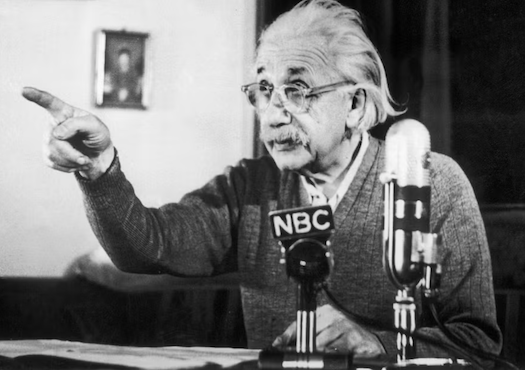
From Humanism to Democratic Socialism, Einstein’s Ideals Continue to Inspire Contemporary Political Leaders and Global Movements

New York, N.Y. — A century after his scientific breakthroughs shook the foundations of modern physics, Albert Einstein remains an enigmatic and widely admired figure—not only within academic circles but far beyond.
Yet, too often, his profound impact as a public intellectual, a Humanist, and a political progressive has been overlooked or simplified in mainstream narratives. Like New York State Assemblymember Zohran Kwame Mamdani, who champions Democratic Socialism for the twenty-first century, Einstein’s political convictions were as radical and courageous as his theories on relativity.
At a moment when progressive politics are reshaping debates from Berlin
to the U.S. Congress, revisiting Einstein’s ideological commitments offer
vital lessons on the intersection of ethics, governance, and social justice.
The Scientist as Citizen: Einstein’s Radical Commitments
For much of his adult life, Albert Einstein saw his scientific work as inseparable from his ethical obligations to human society. Unlike the archetypal absent-minded professor, Einstein was acutely attuned to the political and moral currents of his era.
Whether warning U.S. President Franklin D. Roosevelt about the military potential of atomic fission or publicly opposing racism across the United States, Einstein applied his intellectual rigor and moral seriousness to issues ranging far beyond the laboratory.

His Humanism stemmed from a deep trust in the dignity and rationality of individuals, coupled with an abiding skepticism of authoritarianism.
Einstein’s commitment to Democratic Socialism—which he articulated in various essays, the most famous being “Why Socialism?” (1949)—was not simply an academic preference.
He saw the twin crises of economic inequality and the erosion of democratic freedoms as existential threats, both scientifically and morally indefensible.
“In my opinion,” Einstein wrote, “the real purpose of socialism is precisely to overcome and advance beyond the predatory phase of human development.”
For Einstein, scientific progress that ignored ethical responsibility was bereft of virtue.
In his adopted home of Princeton, New Jersey, and throughout his public life, Einstein never shied away from his status as a global citizen—a role extending as naturally from his worldview as did his equations from the laws of physics.
Kinship Across Generations: Zohran Mamdani and the New Left
Fast-forward to 2025, and Einstein’s worldview finds fresh echoes in the activism of leaders like Zohran Mamdani, a member of the New York State Assembly and a prominent figure in the Democratic Socialists of America (DSA).

Like Einstein, Mamdani foregrounds structural inequality and collective responsibility.
Though their fields and historical contexts differ, both argue that scientific and political progress must serve humanity’s common good, rather than the narrow interests of elites or the machinery of the state.
Both men faced pushback for their views. Einstein, dogged by FBI surveillance and red-scare hysteria, was often tarred as “un-American.”
Mamdani, frequently challenged by mainstream political opponents, channels similar resilience—advocating for housing rights, police reform, and robust social safety nets.
In their unflinching advocacy for social justice, they demonstrate the continuing relevance of “Democratic Socialism” as a dynamic philosophy rather than a relic of the past.
Science, Humanism, and the Politics of Conscience
Central to Einstein’s intellectual journey was his profound role as a Humanist.

In an era overshadowed by war and genocide, Einstein’s insistence on the intrinsic value of every human being—regardless of nationality, race, or religion—stands as a beacon of hope.
As a Jewish refugee who fled Nazi Germany for the United States in 1933, Einstein’s personal experience of persecution sharpened his sense of global solidarity.
He spoke out forcefully against racism in the U.S., joining the NAACP and denouncing the “relatively mild, but stubborn form of anti-Semitism” he observed in American life.
Above all, his advocacy was grounded in the scientific principle that the universe is intelligible and, by extension, that humanity shares a common rationality.
This philosophical orientation provided the foundation for what he called the “cosmic religion”—a reverence for nature and reason that transcended sectarian dogma.
By championing securities for the most vulnerable members of society, Einstein prefigured postwar developments in human rights and international law.
His Humanism, like his commitment to Democratic Socialism, was never abstract: it was a call to collective action, ethical governance, and unwavering solidarity across the boundaries that so often divide humankind.
Democratic Socialism: Einstein’s Enduring Political Prescription
What, then, did Democratic Socialism mean for Einstein—and what does it mean for those who claim his intellectual legacy today? For Einstein, socialism was not a rigid formula of state ownership but rather a robust vision of economic democracy.

In his essays, he argued for the regulation of unbridled capitalism, social investment in scientific and cultural education, and a welfare state guaranteeing the essentials of life for all.
His critiques, ahead of their time, anticipated many of the driving issues in contemporary politics: the predatory excesses of corporate power, the corrosive influence of money in democratic institutions, and the alienation produced by mass consumer culture.
Time and again, Einstein returned to the necessity of balancing individual creativity with social responsibility—a position that nurtured both innovation and equality.
Within today’s debates over universal healthcare, public education, and housing, Einstein’s insights prove uncannily prescient.
Leaders like Zohran Mamdani inherit this vision, crafting policy solutions and social movements rooted in principle, inclusion, and evidence-based governance.
Their shared commitment to both reason and empathy stands as a challenge to cynicism, polarization, and the creeping authoritarianism of our age.
Legacy and Lessons in an Age of Political Upheaval
Perhaps the deepest lesson of Einstein’s public life is that scientific genius and political courage need not exist in separate spheres. Rather, each can amplify and clarify the other—guiding societies toward greater justice, freedom, and human flourishing. For Einstein, being a citizen of the world brought moral as well as intellectual obligations.
As the twenty-first century unfolds—with escalating climate crises, widening economic disparities, and resurgent ultra-nationalism—Einstein’s political commitments offer enduring guidance. They call upon today’s activists, scholars, and policymakers to unite the search for truth with the work of building a more just and compassionate society.
It is here, in the synthesis of science, Humanism, and social democracy, that the path laid by Einstein and his contemporary successors like Zohran Mamdani continues to inspire.
In a time when progress faces formidable headwinds and the search for principled leadership grows ever more urgent, the intertwined legacies of Einstein and today’s democratic socialists serve as a reminder: The future belongs to those who unite knowledge with justice, and vision with action.
Note: Albert Einstein is one of the 36 Global Heroes held out as role models to the children of Orphans International Worldwide.
Summary
Einstein was not only a revolutionary physicist but a deeply committed political progressive and Humanist. Like contemporary leaders such as Zohran Mamdani, he championed Democratic Socialism, advocating for social justice, economic democracy, and human dignity. Einstein believed science and ethics must work together for the common good. Today, his legacy guides leaders and activists as they seek to unite progressive politics with empathy, reason, and public service. Einstein’s vision remains powerfully relevant for our time.
#EinsteinProgressive #HumanismInPolitics #DemocraticSocialism
#ZohranMamdani #ScienceAndJustice #EinstensLegacyToday
TAGS: Einstein, Humanism, progressive politics, Democratic Socialism, Zohran Mamdani,
20th-century history, U.S. political history, ethics, science and society, social justice, civil rights
